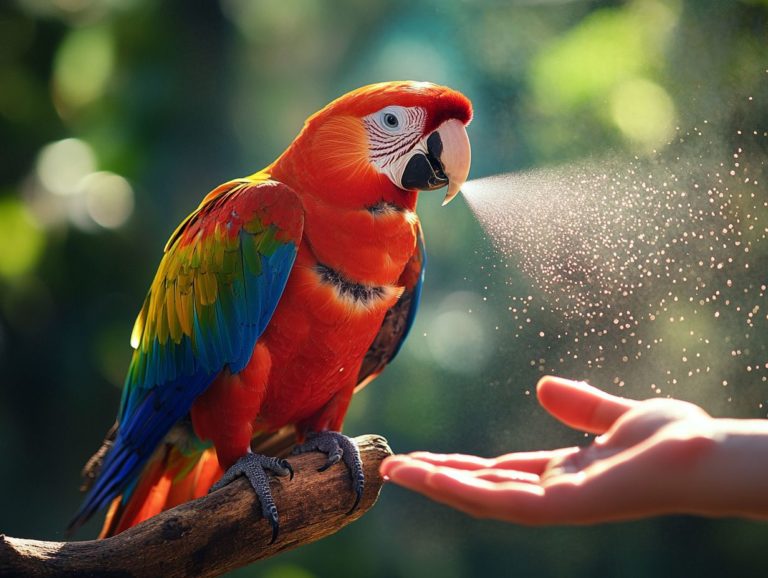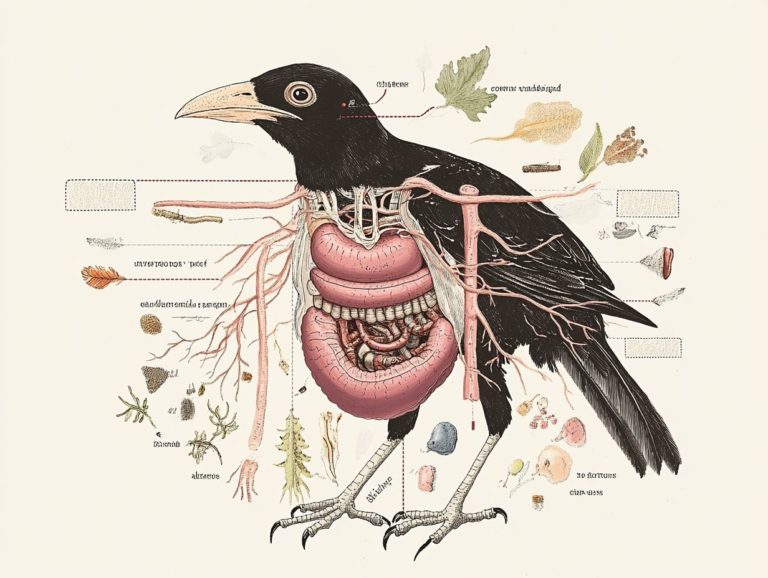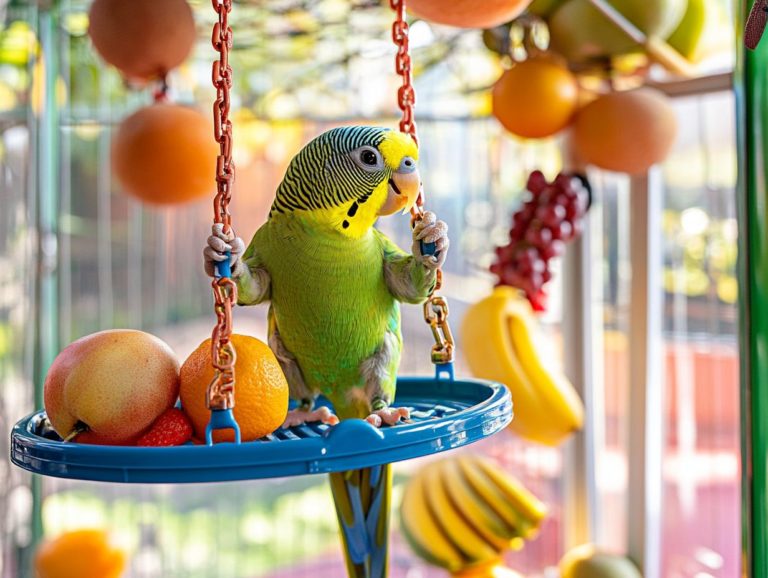Top 10 Signs of a Healthy Pet Bird
Ensuring your pet bird is both healthy and happy is vital for their wellbeing and enhances your experience as an owner.
This article showcases the top ten signs that reveal a thriving feathered friend, from their vibrant appearance to their engaging personality.
Delve into effective strategies to maintain their health, recognize common concerns, and uncover tips for cultivating a clean and enriching environment.
Get excited to learn how to keep your feathered friend in top shape!
Contents
- Key Takeaways:
- 1. Bright and Alert Appearance
- 2. Clean and Glossy Feathers
- 3. Active and Energetic Behavior
- 4. Good Appetite and Eating Habits
- 5. Normal Droppings
- 6. Clear and Bright Eyes
- 7. Smooth and Flexible Feet
- 8. Well-Groomed Beak
- 9. Social and Interactive with Humans
- 10. Vocalization and Talking Ability in Birds
- How to Maintain a Healthy Bird?
- Frequently Asked Questions
Key Takeaways:
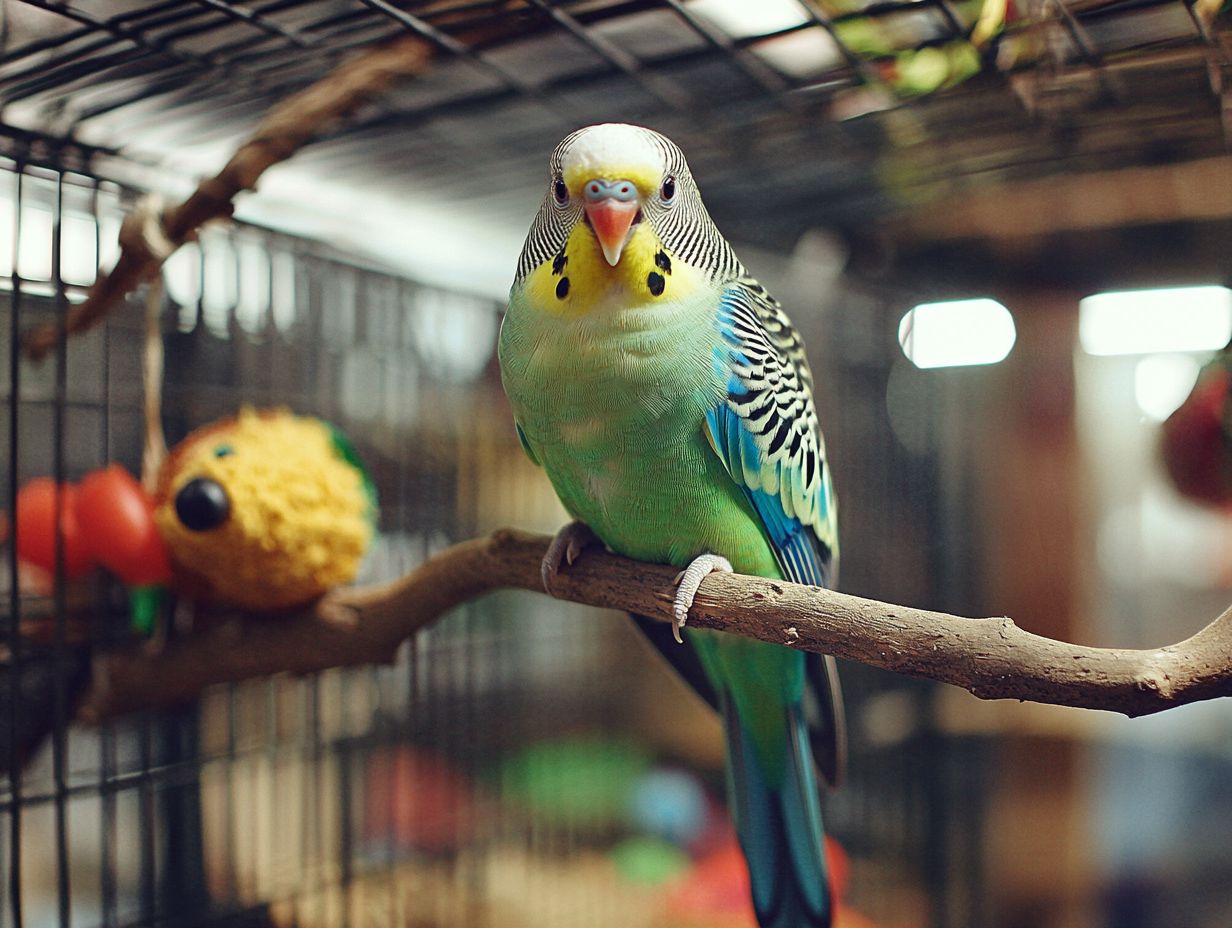
- A healthy pet bird should have a bright and alert appearance, clean and glossy feathers, and active behavior.
- Good appetite, normal droppings, and clear eyes are also signs of a healthy bird.
- Well-groomed beak, smooth feet, and social interaction with humans are indicators of a healthy and happy pet bird.
1. Bright and Alert Appearance
A bright and alert appearance shows that your pet bird is healthy. It signals that your feathered friend is thriving without health concerns.
Schedule regular vet check-ups with an avian specialist. This is crucial for your bird’s well-being.
By closely observing your bird’s feathers, eyes, and behavior, you can easily spot signs of distress or illness. Look for vibrant plumage, bright and clear eyes, and alert body language—these all suggest a happy, healthy avian friend by your side. Additionally, teaching them fun activities can enhance their well-being; check out the top 10 tricks to teach your pet bird for ideas that promote engagement and happiness, free from issues like feather plucking.
On the flip side, dull feathers, lethargy, or nasal discharge might signal common issues like respiratory infections or nutritional deficiencies. That s why regular vet visits are essential for preventive care and the early detection of potential problems.
A thriving bird usually showcases bright colors and actively engages with its surroundings, reflecting the benefits of a healthy lifestyle supported by proper nutrition and mental stimulation to prevent issues like egg-binding and bumblefoot.
2. Clean and Glossy Feathers
Clean and glossy feathers serve as vital indicators of your pet bird’s health. Maintaining them reflects not only proper hygiene but also the absence of issues like feather plucking and diseases such as a virus that can make birds sick and PBFD.
Investing time in regular grooming can significantly enhance your bird’s overall well-being. Routine baths whether using water or a light mist of bird-safe spritz ensure that their feathers remain hydrated and free from dirt.
Keep an eye out for feather abnormalities, such as broken or misshapen feathers; these could signal underlying health issues that may require veterinary attention.
Regular grooming strengthens the bond between you and your bird. It also promotes a happier, healthier companion, showcasing vibrant feathers that are truly a joy to behold, crucial for preventing a virus that can make birds sick and PBFD.
3. Active and Energetic Behavior
Active and energetic behavior in your pet birds is a clear indicator of their physical health and overall well-being. This lively demeanor underscores the importance of mental stimulation that their environment and your interactions provide.
To cultivate this spirited behavior, introduce a variety of bird toys. Consider incorporating toys that encourage searching for food; these not only stimulate their natural instincts but also inspire them to explore and engage with their surroundings.
Arranging playdates or social interactions with other birds or family members can further enhance their emotional health. These activities keep your birds physically active while sharpening their cognitive skills as they learn to solve problems and adapt to new challenges, ultimately fostering a more vibrant and healthy lifestyle.
Ready to observe your bird’s health? Start now by checking their feathers and behavior!
4. Good Appetite and Eating Habits
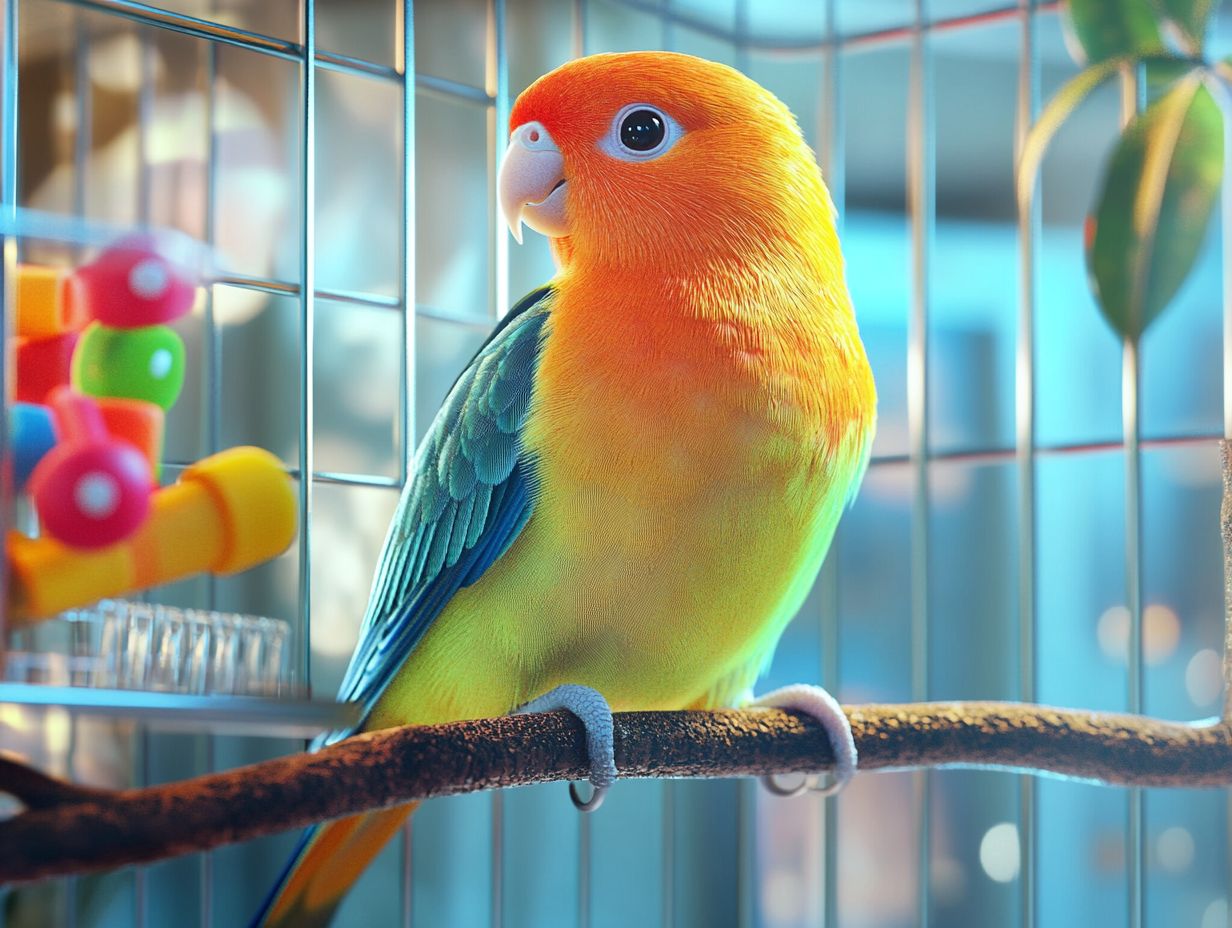
A good appetite and healthy eating habits indicate your pet bird’s well-being. Provide a balanced diet with high-quality bird pellets rich in nutrients like vitamin A and vitamin D.
Include a variety of fresh fruits and vegetables for vital fiber and antioxidants. Seeds and nuts are also essential for healthy skin and feathers.
Pay attention to any changes in their behavior or droppings. Abnormal shapes or colors can signal dietary deficiencies or health issues.
Understanding these elements ensures your feathered companions thrive, leading to a happier experience for both you and your pet.
5. Normal Droppings
Normal droppings indicate your pet bird’s digestive health. Unhealthy droppings may point to underlying problems that need veterinary attention.
Familiarize yourself with the typical color, consistency, and volume of your bird’s droppings. If you notice watery stools, this might indicate infections or dietary imbalances.
Too dark or dry droppings could suggest dehydration or metabolic issues. Being aware of these changes provides vital clues about your bird s overall well-being.
Regular vet check-ups allow for early detection and swift intervention, ensuring your bird maintains good health.
6. Clear and Bright Eyes
Clear and bright eyes are key signs of your pet bird’s health. Dull or cloudy eyes may indicate respiratory problems or other health issues needing immediate veterinary care.
Watch for unusual behaviors or changes in their eye appearance. Signs such as excessive tearing, squinting, or redness around the eyelids require attention.
Common issues can range from infections to serious conditions like cataracts, which could lead to vision impairment. Regular vet check-ups promote a longer, healthier life for your pet.
7. Smooth and Flexible Feet
Smooth and flexible feet are vital for your bird’s health. Signs of bumblefoot or other abnormalities could indicate poor hygiene or underlying issues.
Ensure your bird’s comfort and mobility by keeping their environment clean. Regularly clean their cage to prevent the buildup of droppings and debris.
Provide suitable perches; those that are too smooth or uneven can cause foot problems. Look out for signs of distress, swelling, or sores.
Also, pay attention to any changes in behavior, such as reluctance to perch or play, as these could signal underlying issues.
8. Well-Groomed Beak
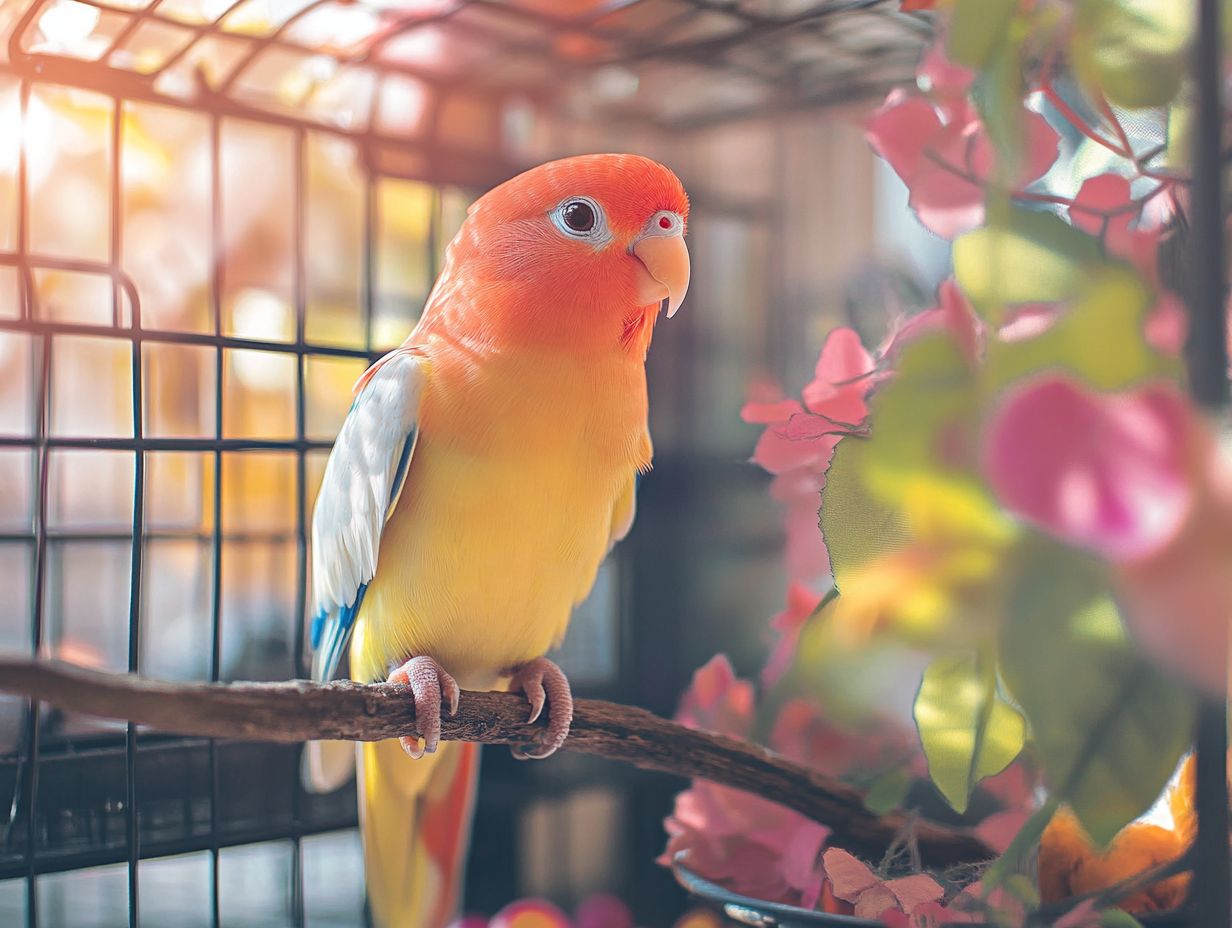
A well-groomed beak is an essential indicator of your companion bird’s health. It signals that they re not grappling with any issues that could compromise their feeding, such as avian polyomavirus or calcium deficiencies.
Beak health is paramount for your feathered friend. Their beaks are crucial for eating, climbing, and engaging with their surroundings. Regular grooming is key and includes providing appropriate toys that encourage natural beak wear. This helps ensure their beaks remain in tip-top shape.
Watch for signs in your bird’s beak; early detection can save their health! Look for overgrowth, discoloration, or cracking, as these could be early warnings of potential health problems. Schedule routine veterinary check-ups to assess the beak’s condition and uncover hidden issues, helping to ensure your pet enjoys a long, healthy, and active life.
9. Social and Interactive with Humans
Social interaction is essential for your pet birds. Those that engage in regular interaction with you tend to enjoy better mental stimulation and overall well-being. This significantly enhances their quality of life.
Participating in activities such as playtime, training sessions, and even casual conversations can greatly strengthen the bond you share with your feathered companions. When they actively participate in their environment, they can express their natural behaviors and help alleviate stress and anxiety.
Birds frequently socialized display more positive social behaviors, highlighting the link between healthy interactions and their psychological health. Incorporating regular bonding activities provides essential stimulation that nurtures happiness and fosters emotional resilience, ultimately reflecting a harmonious coexistence in your shared living space.
10. Vocalization and Talking Ability in Birds
Vocalization and the ability to communicate are not just charming qualities of pet birds; they also serve as vital indicators of their mental stimulation and overall health. This suggests that you have an engaged and content companion.
These vocal expressions can convey a wide range of emotions, from excitement and joy to stress and discomfort. By understanding these vocal cues, you can monitor your avian friend’s well-being more effectively. This allows you to intervene promptly when necessary.
Creating opportunities for your bird to engage vocally through interactive play and meaningful social interaction fosters a stimulating environment. Encouraging your bird to express itself strengthens your special bond!
Enhancing their surroundings with enriching activities can significantly elevate a bird’s happiness and emotional health, ensuring that your companion thrives in a joyful atmosphere.
How to Maintain a Healthy Bird?
Maintaining a healthy bird requires a thorough and well-rounded approach. Prioritize proper hygiene, a balanced diet, mental stimulation, and regular veterinary check-ups to catch potential health issues before they escalate.
To ensure your feathered friend thrives, it s essential to provide a varied and nutritious diet. Incorporate fresh fruits, vegetables, and high-quality pellets tailored specifically to their species. Hygiene practices, such as daily cage cleaning and offering regular opportunities for baths, will keep their feathers in pristine condition and help prevent disease.
Engaging your bird with toys and social interaction is vital for their mental well-being. Schedule veterinary visits every six months for routine health assessments, vaccinations, and early detection of any possible ailments. This comprehensive care contributes significantly to their overall longevity and happiness.
What Are the Common Health Issues in Pet Birds?
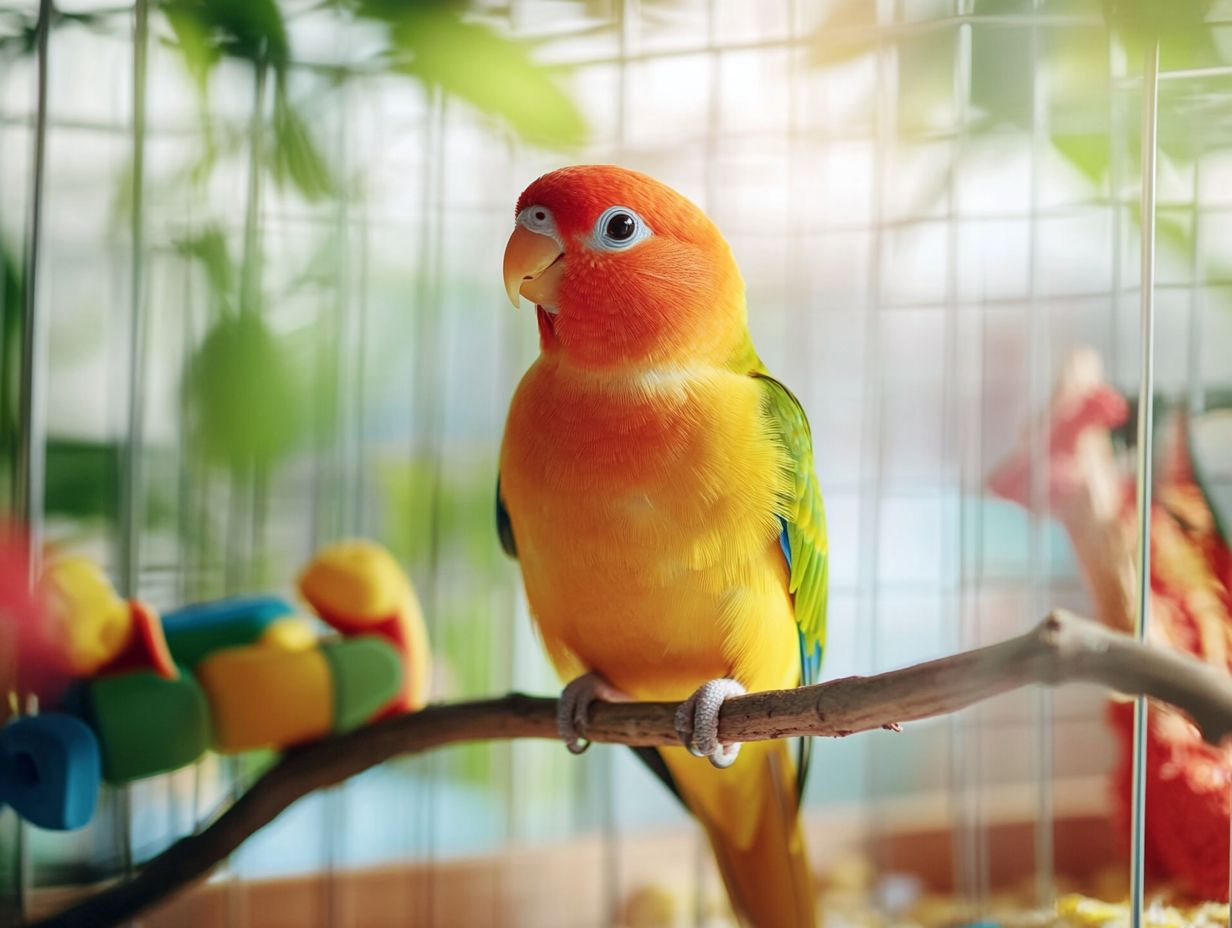
Common health issues in pet birds include psittacosis, avian polyomavirus, bumblefoot, and respiratory problems. These conditions can seriously impact their quality of life if not diagnosed and treated quickly.
Each ailment shows distinct symptoms. Watch for lethargy, messy feathers, difficulty breathing, or swelling on the feet.
The causes vary greatly. They can range from bacterial infections like psittacosis to viruses such as avian polyomavirus. Environmental factors also play a role, especially in conditions like bumblefoot, which often comes from unsuitable perches or unclean living spaces.
Your treatment options may include medications, dietary changes, and improvements to their living conditions. Regular vet visits help catch these issues early, ensuring your feathered friends get the care they need to thrive.
How Can a Bird Owner Spot Signs of Illness?
Spotting signs of illness in your pet birds is essential for timely intervention. Look for unhealthy droppings, feather abnormalities, changes in behavior, and a lack of mental stimulation, as outlined in our guide on understanding bird behavior: health indicators.
Stay alert for additional signs like lethargy, changes in sounds, or difficulty with balance. Physical signs such as swelling, unusual discharge from the eyes or beak, or irregular breathing can indicate serious health issues.
Behavioral changes, like increased aggression or withdrawal from social interaction, may signal distress or pain. By observing these symptoms and seeking veterinary help quickly, you greatly improve your birds’ chances for a positive health outcome!
What Are the Essential Nutrients for a Bird’s Diet?
Essential nutrients for your bird’s diet include calcium, vitamin A, and vitamin D. These nutrients help maintain health and prevent various issues.
Calcium is crucial for strong bones and proper egg production. Vitamin A supports vision, skin health, and immune function, boosting your bird’s overall vigor.
Vitamin D helps your bird absorb calcium, maintaining skeletal integrity. A balanced diet is vital, and high-quality bird pellets provide a solid foundation rich in essential vitamins and minerals.
Pairing these pellets with fresh produce like leafy greens, carrots, and bell peppers enhances nutrient intake and digestion. Offering a variety of foods ensures your avian friend thrives with optimal health!
What Are the Best Practices for Bird Cage Hygiene?
Keeping your birdcage clean is essential for preventing health issues. Regular cleaning with bird-safe products creates a tidy environment.
Establish a consistent cleaning routine to manage droppings and food spills. This ensures the cage stays free from harmful bacteria. Use products designed for avian care, as many household cleaners can be dangerous for your birds.
Aim to wipe down surfaces daily, disinfect weekly, and thoroughly clean all accessories at least once a month. Proper ventilation and avoiding overcrowding in the cage help minimize the spread of germs.
How Can a Bird Owner Bond with Their Pet?
Bonding with your pet bird is vital for their mental stimulation and emotional well-being. You can achieve this through engaging activities that build trust and companionship.
These activities include interactive playtime, where your bird explores toys and puzzles. Structured training sessions can help build confidence and reinforce good behavior.
Spending time with family members is crucial for cultivating a strong connection. Regular gentle handling encourages your bird to feel comfortable and loved.
Participating in these meaningful experiences enhances your bird’s social skills and improves their overall health. As a result, you ll have a happier and more vibrant companion!
The joy you both share from these interactions creates a deeper bond that enriches the lives of you and your feathered friend. Watch your connection grow!
Frequently Asked Questions
What are the top 10 signs of a healthy pet bird?
- Bright, alert, and active behavior: A healthy bird will be curious, playful, and attentive to its surroundings.
- Smooth and shiny feathers: A bird’s feathers should be glossy and free of any bald patches or broken feathers.
- Clean and dry nostrils: The nostrils of a healthy bird should be clear of any discharge or crustiness.
- Clear and bright eyes: A healthy bird will have clear, bright, and alert eyes without any discharge or redness.
- Active appetite: A healthy bird will have a good appetite and eagerly eat its food.
- Regular droppings: A bird’s droppings should be consistent in color, texture, and frequency if it is in good health.
- Proper weight and body condition: A healthy bird should have a well-rounded body with no protruding bones.
- Constant preening: A bird that regularly preens itself is a sign of good health and grooming habits.
- Vocalization: A healthy bird will make a variety of vocalizations and sounds, indicating a content and happy state.
- Clean environment: A healthy bird should live in a clean and well-maintained environment with access to fresh water and food.
Start creating joyful moments with your feathered friend today!


